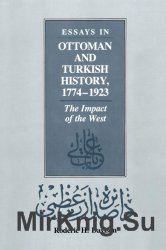
Название: Essays in Ottoman and Turkish History, 1774–1923. The Impact of the West
Автор: Roderic H. Davison
Издательство: University of Texas Press
Год: 1990
Формат: pdf
Страниц: 296
Размер: 11.3 Мб
Язык: English
The effect of Western influence on the later Ottoman Empire and on the development of the modern Turkish nation-state links these twelve essays by a prominent American scholar. Roderic Davison draws from his extensive knowledge of Western diplomatic history and Turkish history to describe a period in which the actions of the Great Powers, incipient and rising nationalisms, and Westernizing reforms shaped the destiny of the Ottoman Empire and the creation of the new Turkish Republic.
Eleven of the essays were previously published in widely scattered journals and multi-authored volumes. The first of these provides a general survey of Turkish and Ottoman history, from early Turkish times to the end of the Empire. The following essays continue chronologically from 1774, detailing some of the changes in the nineteenth-century Empire. Several themes recur. One is the impact of Western ideas and institutions and the resistance to that influence by some elements in the Empire. Another concerns the diplomatic pressure exerted by the Great Powers of Europe on the Empire, which amounted at times to direct intervention in Ottoman domestic affairs. Taken together, the essays portray a confluence of civilizations as well as a clash of cultures.
Acknowledgments
Introduction
1. The Turks in History: A capsule account of Turkish origins and of the rise, height, decline, and reform of the Ottoman Empire, to the rise of the Republic.
2. “Russian Skill and Turkish Imbecility”: The Treaty of Kuchuk Kainardji Reconsidered: The Ottoman-Russian treaty of 1774, allowing Russia great commercial and diplomatic privileges and a dubious “right” to protect Christians in Ottoman domains.
3. The “Dosografa” Church in the Treaty of K???k Kaynarca: On the nature of the Christian church that the 1774 treaty allowed the Russians to build in Istanbul, and to protect. And was it built?
4. The First Ottoman Experiment with Paper Money: Why and how the Sublime Porte, in 1840, issued treasury notes that became the first circulating paper money, and attendant problems.
5. Foreign and Environmental Contributions to the Political Modernization of Turkey: The influence of military defeat by outside powers, and of diplomatic pressure; the importance of foreign concepts and models; channels for new ideas.
6. The Advent of the Principle of Representation in the Government of the Ottoman Empire: How representation of the people in government organs began in 1840 on the provincial level and grew to affect the central government, especially with the constitution of 1876.
7. Turkish Attitudes Concerning Christian-Muslim Equality in the Nineteenth Century: The advent of an official policy of egalitarian and secular Ottomanism; the views of leading statesmen on Christian equality, and popular attitudes.
8. The Advent of the Electric Telegraph in the Ottoman Empire: How Morse’s invention was introduced at the time of the Crimean War, how the telegraph system expanded, and the effects of the new technology on Ottoman government and society.
9. Westernized Education in Ottoman Turkey: An assessment of the impact of foreign mission schools, Ottoman technical schools, and the new Ottoman secular educational beginnings, and study abroad.
10. The Armenian Crisis, 1912–1914: Russia raises for her own interests the question of reforms in eastern Anatolia where most Armenians lived; the machinations of all six great powers of Europe; the Porte and the powers find a temporary solution.
11. Turkish Diplomacy from Mudros to Lausanne: How the nationalist movement led by Mustafa Kemal (Atat?rk) dealt with outside powers, 1919 to 1923, trying to get rid of British, French, Italian, Greek, and Armenian occupation forces; success lays a basis for the Republic.
12. Atat?rk’s Reforms: Back to the Roots: An analysis of the origins and background of many of the Turkish Republic’s basic political principles and practices, tracing them back to nineteenth-century developments in the period of Ottoman reform.
Index
|